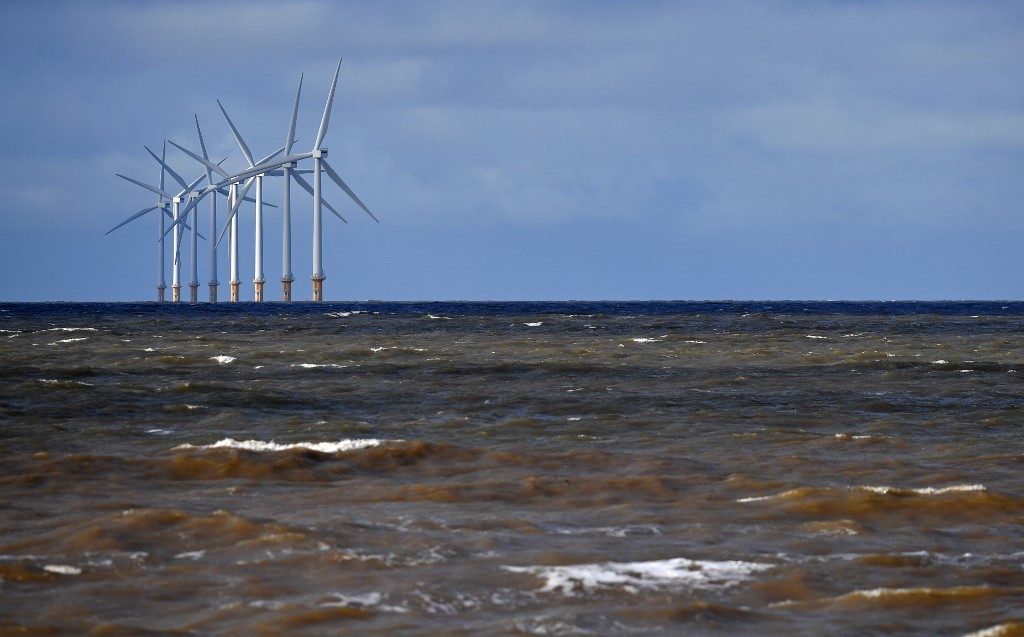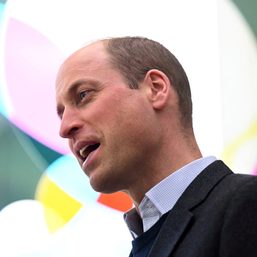SUMMARY
This is AI generated summarization, which may have errors. For context, always refer to the full article.

Prime Minister Boris Johnson on Tuesday, October 6, sought to blow away the coronavirus blues with a new plan to turn Britain into the Saudi Arabia of wind power using energy from floating turbines.
In an upbeat speech closing his Conservative party’s annual conference, Johnson sketched out an eye-catching plan to quadruple power generated by offshore wind from 10 to 40 gigawatts this decade.
But environmentalists said the plan fell woefully short of a promised “green recovery” to build a sustainable economy after the COVID-19 crisis.
The prime minister said new investment of £160 million ($208 million, 176 million euros) for ports and factories to make next-generation turbines would support 60,000 jobs.
And political opponents accused him of seeking to divert attention from a long series of pandemic failures with pie-in-the-sky optimism that was little more than hot air.
The prime minister said new investment of £160 million ($208 million, 176 million euros) for ports and factories to make next-generation turbines would support 60,000 jobs.
“Offshore wind will be powering every home in the country,” Johnson told the online conference, which this year has been accompanied by Conservative mutterings over his leadership amid a second wave of the pandemic.
“As Saudi Arabia is to oil, the UK is to wind – a place of almost limitless resource, but in the case of wind without the carbon emissions, without the damage to the environment,” he said.
Rice puddings
Wind turbines on land are cheaper and more efficient, as they sit closer to the power grid.
But they are unpopular with many, especially Conservative backbenchers in rural constituencies, and their development has been stymied by planning regulations.
Johnson gave a nod to such opposition in noting, “I remember how some people used to sneer at wind power, 20 years ago, and say that it wouldn’t pull the skin off a rice pudding.”
In fact, when he was mayor of London in 2013, Johnson himself said shale gas was a better answer to energy shortages than wind power, which he said “failed to pull the skin off a rice pudding.”
As mayor, Johnson was criticized for quixotic plans such as “Boris Island,” a new airport in the Thames estuary that came to naught, and a “garden bridge” over the river that incurred more than £50 million in planning costs before the project was abandoned.
‘Gale force speed’
The main opposition Labour party said the prime minister was neglecting to fix serial problems in Britain’s response to the pandemic.
Labour’s deputy leader Angela Rayner said of the speech: “The British people needed to hear the prime minister set out how he and his government will get a grip of the crisis.
“Instead we got the usual bluster and no plan for the months ahead.”
Green Party MP Caroline Lucas said investment in offshore wind was welcome, but Johnson’s announcement “falls woefully short of a comprehensive green new deal.”
Energy specialists also cast doubt on the feasibility of Johnson’s pledge to power domestic heating systems from offshore wind within a decade.
Britain has suffered the worst death toll in Europe from the COVID-19 outbreak, with more than 42,000 confirmed deaths, and cases are on the rise again.
Critics say others such as France and Germany have gone further with detailed plans to put the environment front and center of their post-virus rebuilding.
Britain will host the United Nations’ next climate change summit, which has been pushed back to 2021 because of the pandemic, but has been attacked for failing to spell out action to meet its goal of reaching net zero carbon emissions by 2050.
Johnson insisted that his government was pushing on with “gale force speed” to create a green industrial revolution, which “in the next 10 years will create hundreds of thousands, if not millions, of jobs.” – Rappler.com
Add a comment
How does this make you feel?


![[Time Trowel] Evolution and the sneakiness of COVID](https://www.rappler.com/tachyon/2024/02/tl-evolution-covid.jpg?resize=257%2C257&crop=455px%2C0px%2C1080px%2C1080px)







There are no comments yet. Add your comment to start the conversation.